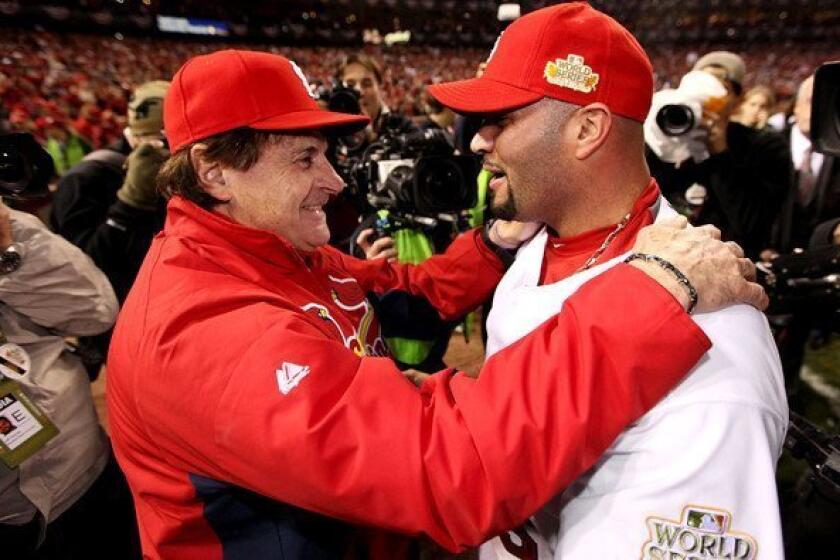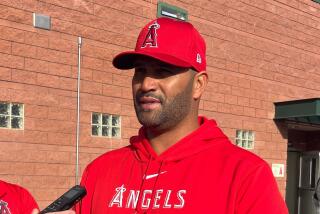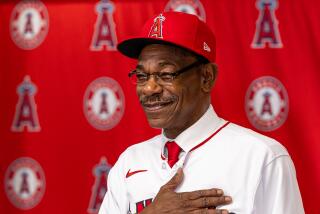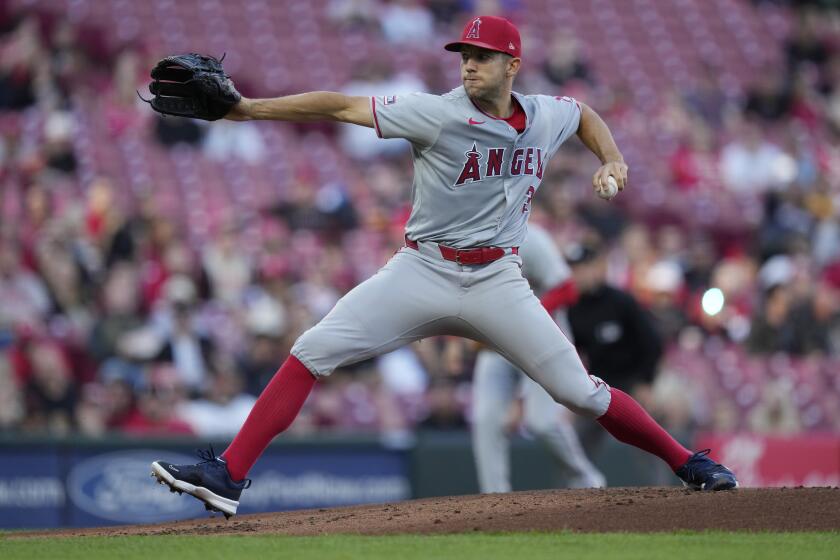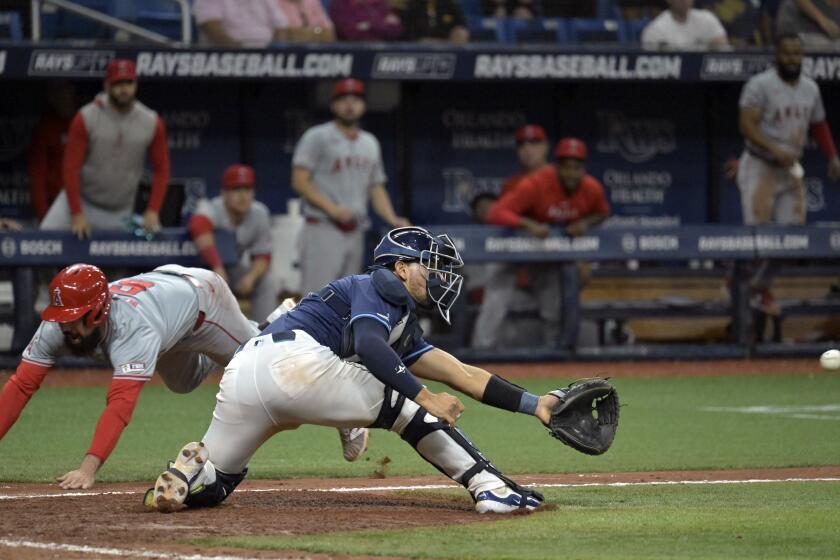‘He can almost not walk away’: What Joe Maddon’s humanitarian efforts reveal about the Angels manager
Joe Maddon is entrusted with the future of the Angels. Hired last month as manager, he will be counted on to end the team’s five-year-long playoff drought. But his reach goes beyond the baseball field and into the homes of sick teenagers, into a once controversial community center he helped erect in his fractured Pennsylvania hometown, and into homeless shelters in Tampa Bay and Chicago.
They are disparate causes. Yet Maddon, 65, has bundled them under a universal goal.
“You never know how it’s really going to stick, or make an impression, or help somebody,” Maddon said. “It’s the proverbial line: If you can help one person, and that one person is motivated in a way to act … it’s worth it.”
::
People pushed shopping carts full of personal belongings down boardwalks in Orange County. Others slept on the filthy floors of public beach restrooms.
Maddon caught that peek into the plight of the homeless 16 years ago riding bicycles along Sunset Beach with his wife, Jaye. The pervasiveness of the issue had escaped his notice before. He was stunned. He said to Jaye: “I can’t believe that somebody has their whole life in a shopping cart. There it is right there. That’s their whole life.”
Jaye suggested he find a way to make a difference. Maddon promised he would, but added a caveat. At the time, he was an Angels coach on track to become a major league manager. He wanted to advocate for people in need when he acquired a larger platform.
Maddon followed through. He and Jaye immersed themselves in the Tampa Bay community upon relocating there for Maddon’s first managerial job in 2006 with the Rays. They created an extended holiday they called “Thanksmas” to serve the needy. They began with homemade meals, Maddon cooking family recipes for hundreds throughout the holiday season.
Their efforts evolved and expanded, but Maddon never strayed from his initial pledge.
Through their Respect 90 Foundation — named for the distance to first base Maddon requires his players to run full speed — he and Jaye have donated services to and raised money for outposts of the Salvation Army, the Homeless Empowerment Program in Clearwater, Fla., and Metropolitan Ministries in Tampa, Fla. The charity also sponsors youth boxing programs in Chicago and Maddon’s altruistic efforts during spring training in Arizona. And it is tied to a community center in Maddon’s hometown of Hazleton, Pa.
Before long, Respect 90 will host the first “Thanksmas” event in the Anaheim area. Maybe Maddon will find a locale near the old Harpoon Harry’s restaurant in Sunset Beach. It was there, many years ago, that Maddon worked on a much smaller scale to help the homeless, passing out clothes and supplies to whoever wandered by.
::
Maddon grew up comfortably in Hazleton. His father, of Italian descent, ran a plumbing business. His mother, of Polish heritage, raised three kids upstairs in one half of a double home shared with other family members. He never wanted for anything.
Yet it was in that city of about 25,000 that Maddon established his worldview.
Many of Hazleton’s residents came from Europe in the late 1800s to mine coal. They imbued the town with their cultures. Their families prospered and propagated. They were not all the same, but they learned to live with each other.
The demographic changed by the mid-2000s. Latino families relocated from New York and their native lands in search of jobs. Rather than welcome them, many Hazleton residents crossed their arms.
When he returned one offseason, Maddon recognized that his beloved hometown had changed. The thriving downtown had been abandoned. People had fled.
“I just thought my city was dying a slow death,” Maddon said.
So, he vowed to fix it. A year later, in the winter of 2011, Maddon, Jaye, his cousin Elaine Curry and her husband, Bob, introduced the town to the Hazleton Integration Project. They planned to create a community center that would serve all the town’s children. Through educational endeavors and arts and sports programs, it would unite people of different cultures in the way the Little League fields of Maddon’s youth brought together Irish, Polish and Italian kids.
Several thousand came through the doors when the center, housed in an old parochial school, opened in 2013. It has never served fewer than 1,000 people a week, Bob Curry said recently.
It was a smashing success in the Latino community. It took a little longer for the longstanding members of the town to come around.
The Grove in Anaheim could be impacted if the Angels build out their stadium parking lot. The concert venue is on land up for possible development.
Joey, what are you doing? critics asked Maddon. Others stopped Curry in the grocery store to tell him their families were doing the “wrong thing.” “Joe, you are not a social engineer,” The Wilkes-Barre Times Leader wrote after Maddon seemed to disrespect townspeople while speaking about the Hazleton Integration Project in a 2017 interview with NBC News. “You are a baseball manager.”
Yet the Integration Project, under the direction of the Currys and with the continuous input of the Maddons, is bridging the gap between longtime residents of the coal-mining town and the newer population of immigrants. Time has bred tolerance among many citizens, Maddon said.
These days he can rattle off a list of the Hazleton Integration Project’s accomplishments — partnerships with Penn State and Temple University, programs benefiting young scholars, and a myriad of community initiatives — and chuckle proudly.
“There’s so many things we’ve done and are still on the horizon,” Maddon said from his Hazleton home. “It’s gotten to the point now where people that have been here before are accepting and understand these are wonderful people just like us. They maybe speak a different language, but the kids speak English beautifully and their parents are learning. It’s like my grandparents. It’s no different.”
::
Cole Eicher sat in a coffee shop in Clearwater, Fla., and flipped through the pages of a bound book of memories. There were images of him at fundraisers, posing with Tampa Bay community leaders and speaking at packed conference halls.
And in the middle of one page, he pointed to a photo of him with Joe and Jaye Maddon at an event in 2018.
Eicher fought brain cancer when he was 12. A few years later, a surgeon removed his colon because the gene mutation that contributed to his medulloblastoma would eventually create cancerous cells in the digestive organ.
Eicher is cancer-free. He golfs for his high school team and intends to enroll in business classes at the University of South Florida next fall. His is about as normal a life as a teenager can lead.
Maddon and Eicher were speaking at the same function in 2018 and he heard Eicher share his bout with cancer. Maddon was so in awe of Eicher’s passion — “He’s different in all the best ways,” Maddon said — that he began his own speech with some self-deprecation.
“Oh my God,” he said. “I’m supposed to follow this kid?”
On the spot, Maddon offered Eicher and his family an all-expenses-paid trip to Cubs spring training for an annual head-shaving event that raises money for pediatric cancer research. While in Arizona, Eicher spoke to reporters about his initiative, sheared off Maddon’s hair and connected with Cubs players and fellow cancer survivors Anthony Rizzo and Jon Lester.
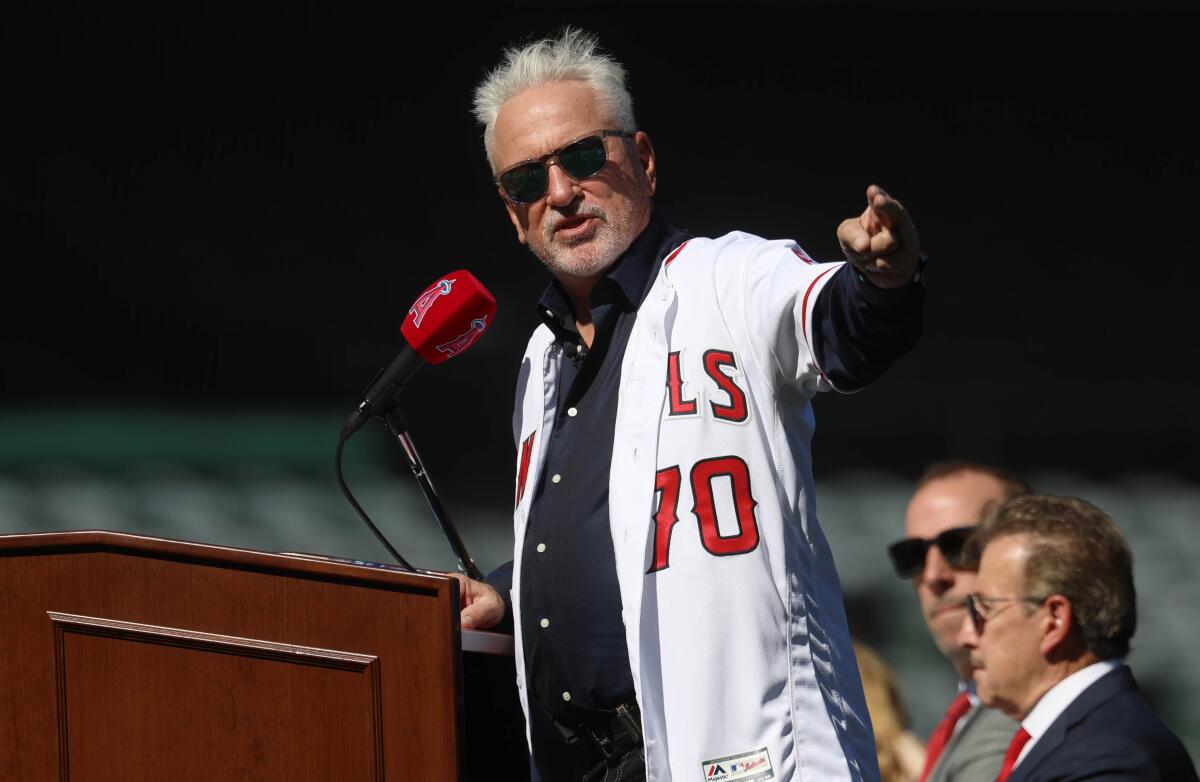
“What Joe Maddon did through those three or four days, me just connecting with that team — it was a great experience,” said Eicher, who raises awareness for pediatric cancer through the Gold Together initiative.
Eicher is one of several children in the Tampa Bay and Chicago communities that Maddon has brought to spring training in Arizona since Respect 90 was formed. Not far from where Eicher lives is the pioneer of the group, Aiden Hawk.
Unlike Eicher, Hawk is still battling disease. The 17-year-old has suffered since birth from chronic health issues that have only recently been ameliorated by new medications. There is yet a parallel between Eicher and Hawk: Hawk, too, says he is better off for the experiences he shared with Maddon.
Hawk’s body was failing him when a business acquaintance of Maddon learned of the teenager’s struggles. Maddon flew Hawk, his parents and his brother to Arizona during spring training in 2017 to give them a trip that didn’t include a stint in a specialized medical center.
They were treated to meals cooked with Hawk’s food allergies in mind, introduced to players and watched games. They were showered with affection.
“It was an extremely pivotal moment for our family,” said Hawk’s mother, Lisa. “We had gone through some really bad times with Aiden’s health and then this happened and it really changed Aiden’s outlook — and all of our outlooks.”
These families have benefited from Maddon’s generosity — and Maddon has drawn inspiration from them.
Hall of Fame manager Tony La Russa, 75, has left his post as a special advisor to the Boston Red Sox to take a similar post with the Angels.
“When you’re that young and critically ill, I think it accelerates your method of thinking,” Maddon said. “You think things that 16-year-olds, 17-year-olds would never even possibly think about unless [they’re] faced with mortality. These kids have taught me that if you really sit down and evaluate things properly, you can accelerate your thinking.”
::
A portion of the population Maddon and his wife have spent more than a decade helping filtered through a building in downtown Tampa one evening this month.
About 80 people sat down for a catered meal hosted by the Salvation Army and provided by Respect 90. The foundation’s director, Rick Vaughn, encouraged attendees to save leftover chicken sandwiches and chocolate chip cookies for their next meals. They took the pairs of socks — homeless people often struggle to acquire that simple but essential piece of clothing — handed to them at the door. Their “thank yous” and “God bless yous” resonated as they stepped back out into the cool night air.
At “Thanksmas” events such as this, the foundation has fed about 1,650 people this year. It has also provided more than 1,700 backpacks and distributed 1,200 pairs of socks. Over the last two years, Respect 90 has donated about $600,000 to more than 60 nonprofits. That figure doesn’t include an additional $100,000 in in-kind donations.
Maddon, of course, cannot eradicate homelessness. There were nearly 7,000 homeless people in Orange County at the beginning of the year, according to the county point-in-time survey. Nearly 60,000 were counted in Los Angeles County. Both populations had increased since they were last counted.
Maddon can’t change their circumstances, but he can to try to soothe them.
“He’s got this great human heart, this great sense of humanity, that when someone is hungry and homeless on the street, if he is a position to do something about that, he can almost not walk away,” said Curry, Maddon’s cousin-in-law. “That’s who he is. Whether it’s homelessness, feeding the hungry, pediatric cancer or helping shift the paradigm of immigration in his hometown, those are all callings to Joe.”
More to Read
Go beyond the scoreboard
Get the latest on L.A.'s teams in the daily Sports Report newsletter.
You may occasionally receive promotional content from the Los Angeles Times.

